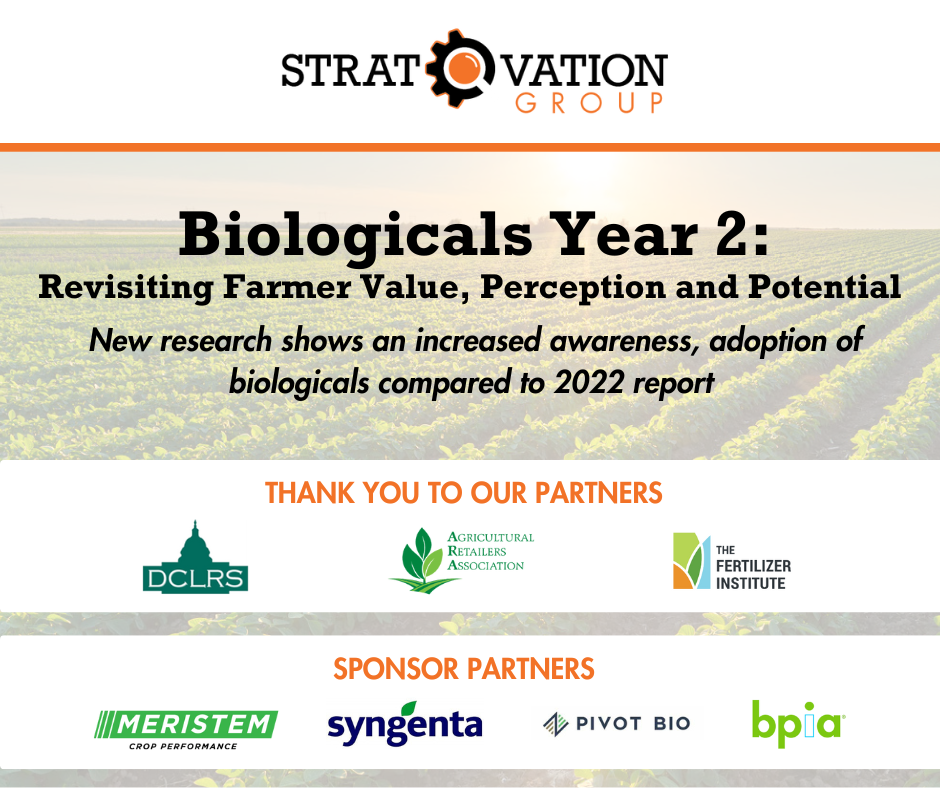Sector on the Rise: Updated Research of U.S. Row-Crop Farmers by Stratovation Group Shows Increased Awareness, Adoption of Biologicals Compared to 2022 Report
This study is Sponsored by Meristem Crop Performance, Pivot Bio, BPIA, and Syngenta,
with Strategic support provided by The Fertilizer Institute, Agricultural Retailers Association, and DCLRS.
August 22, 2024 — Signifying that agricultural biologicals continue to be a rapidly growing platform, row crop farmers report their use of the innovative crop inputs increased by 8 percentage points over the last two years. Broad awareness of biologicals among row-crop farmers also went up by 4 percentage points over that time, according to updated research conducted by Stratovation Group.
The new study, Ag Biologicals: Revisiting Farmer Value, Perception and Potential, follows by two years the ground-breaking benchmark study conducted by Stratovation Group about the use of biologicals on U.S. row crops. Over that time, awareness of biologicals among row-crop farmers increased to 87%, from 83% in 2022. Awareness of specific subcategories, biostimulants and biofertilizers, were both up 14 percentage points.
“The sustained growth in awareness and adoption of agricultural biologicals among U.S. row-crop farmers is a testament to the sector’s innovative momentum and the undeniable value these sustainable inputs bring to modern farming practices,” said Cam Camfield, CEO of Stratovation Group. “As we continue to see these numbers rise, it’s clear that biologicals are not just a trend but have become a pivotal component in the present and future of agriculture.”
Like the initial biologicals study, influential agricultural groups, including, The Fertilizer Institute, the Agricultural Retailers Association and DCLRS, a bipartisan government relations firm, joined Stratovation Group as strategic partners. The objective of the updated research, like the first study, was to assess the opinions of U.S. row-crop farmers regarding these still relatively new, natural crop inputs among traditional row-crop growers.
While just under half (45%) of all row-crop producers say they currently purchase or use ag biological products on their fields, that number is up 8 percentage points from 2022’s benchmark survey. Farmers who use biologicals on their row-crop fields continue to rate them positively, and increased yield was by far the most common metric of success among biological users (85%), followed by profitability at (45%).
“Farmers who apply biologicals to their corn, soybeans and other row crops consistently told us they view these natural inputs as sustainable tools that boost yields, enhance profitability and provide soil health benefits,” Camfield shared. “We will continue to track these sentiments going forward, but if you look at all the market indicators in and beyond our study, this class of crop inputs is on a steep upward trajectory.
“To our surprise, the numbers were consistently higher than those in the benchmark study. However, we also learned that a significant amount of additional education is still needed to help this market reach its full potential. Biological companies should continue to take the enlightened approach of sharing performance results far and wide with influential farmers as well as their trusted crop advisors and agronomists.”
The study included a detailed look at related topics, including farmer demographics, the make-up of the farm’s team and capabilities, selected on-farm practices, preferred retail channel and trusted partners. The research also dug into the awareness, perception, and definition of key terms, biological purchase history, usage, practices, and future intent, as well as recognition of leading biological companies and brands.
The comprehensive results and a deep dive into our 139-page research presentation are available for purchase.
“As a service to agriculture, we thought it was important to share some of the most eye-opening top-line results,” Camfield said. “We couldn’t resist sharing this information because the findings are overwhelmingly positive and that bodes well for biologicals increasing the efficiency and sustainability of the entire row-crop sector.”
“The rising adoption of agricultural biologicals represents a significant shift not only in farming practices but also in the broader public policy landscape for food and agriculture,” said Jay Vroom, Strategic Advisor for DCLRS. “As these innovative inputs gain traction, they promise substantial economic benefits through enhanced crop yields and profitability. Moreover, their potential to improve soil health and reduce reliance on traditional chemical fertilizers aligns with society’s sustainability aspirations. Policymakers need to take note of these advancements and consider supportive measures that encourage further adoption and integration of biologicals into mainstream agriculture.”
Of those farmers not currently using biologicals, most said they would be willing to try them if their profitability could be further proven.
Sponsoring companies and organizations that made the research possible with their support included Meristem Crop Performance, Pivot Bio, Syngenta and the Biological Products Industry Alliance (BPIA). The project was conducted in two phases, a qualitative study that included hour-long, in-depth farmer interviews, followed by a quantitative survey of more than 600 full-time, professional row-crop producers. The survey was conducted using a mixed approach and was fielded in the Spring of 2024.
—————————————————————————————————–
For more information or to purchase a copy of the full report, contact Camfield at [email protected].

